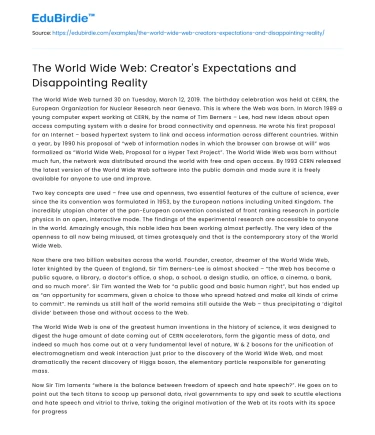The World Wide Web turned 30 on Tuesday, March 12, 2019. The birthday celebration was held at CERN, the European Organization for Nuclear Research near Geneva. This is where the Web was born. In March 1989 a young computer expert working at CERN, by the name of Tim Berners – Lee, had new ideas about open access computing system with a desire for broad connectivity and openness. He wrote his first proposal for an Internet – based hypertext system to link and access information across different countries. Within a year, by 1990 his proposal of “web of information nodes in which the browser can browse at will” was formalized as “World Wide Web, Proposal for a Hyper Text Project”. The World Wide Web was born without much fun, the network was distributed around the world with free and open access. By 1993 CERN released the latest version of the World Wide Web software into the public domain and made sure it is freely available for anyone to use and improve.
Two key concepts are used – free use and openness, two essential features of the culture of science, ever since the its convention was formulated in 1953, by the European nations including United Kingdom. The incredibly utopian charter of the pan-European convention consisted of front ranking research in particle physics in an open, interactive mode. The findings of the experimental research are accessible to anyone in the world. Amazingly enough, this noble idea has been working almost perfectly. The very idea of the openness to all now being misused, at times grotesquely and that is the contemporary story of the World Wide Web.
Save your time!
We can take care of your essay
- Proper editing and formatting
- Free revision, title page, and bibliography
- Flexible prices and money-back guarantee
Now there are two billion websites across the world. Founder, creator, dreamer of the World Wide Web, later knighted by the Queen of England, Sir Tim Berners-Lee is almost shocked – “the Web has become a public square, a library, a doctor’s office, a shop, a school, a design studio, an office, a cinema, a bank, and so much more”. Sir Tim wanted the Web for “a public good and basic human right”, but has ended up as “an opportunity for scammers, given a choice to those who spread hatred and make all kinds of crime to commit”. He reminds us still half of the world remains still outside the Web – thus precipitating a ‘digital divide’ between those and without access to the Web.
The World Wide Web is one of the greatest human inventions in the history of science, it was designed to digest the huge amount of date coming out of CERN accelerators, form the gigantic mess of data, and indeed so much has come out at a very fundamental level of nature, W & Z bosons for the unification of electromagnetism and weak interaction just prior to the discovery of the World Wide Web, and most dramatically the recent discovery of Higgs boson, the elementary particle responsible for generating mass.
Now Sir Tim laments “where is the balance between freedom of speech and hate speech?”. He goes on to point out the tech titans to scoop up personal data, rival governments to spy and seek to scuttle elections and hate speech and vitriol to thrive, taking the original motivation of the Web at its roots with its space for progress – oriented minds to collaborate in a free open unbiased ambiance, away to the unholy mass of all too familiar dirty tricks.
Clearly, the challenges come from the same source that make it wonderful, that is the central problem. The big players have built up surveillance machines, purely for undue advantage essentially for profit beyond proportion – spouting misinformation and fake information have become the hallmarks of a successful business empire. The Web has the essential ingredient for the information explosion and some of it is excellent, but in this ocean of information where in the knowledge, as T. S. Eliot will put it, drowned in fake news and cybercrimes the World Wide Web is only thirty years old, but already is an old and haggard man, with lines on the young face, the lines of acute anxiety, formidable fear, with the serious possibility of information and fake information will win over the noble pursuit of seeking knowledge by honest and open sharing.






 Stuck on your essay?
Stuck on your essay?

